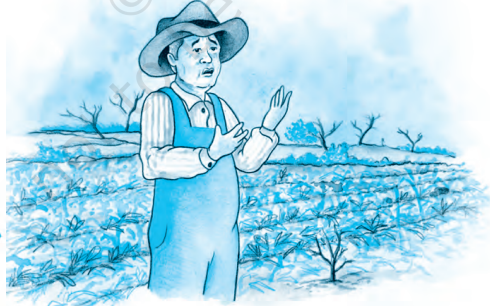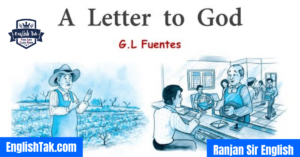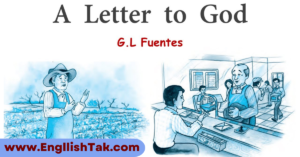![]()
A Letter to God Explanation Line by Line in English and Hindi
A Letter to God Explanation Line by Line in English and Hindi – In this blog post, we will delve into the first chapter of the CBSE Class 10 English textbook First Flight titled “A Letter to God” by G.L. Fuentes. This touching short story takes us through the journey of a simple and determined farmer, Lencho, who has unshakable faith in God. His belief in divine intervention leads him to write a letter to God when his crops are destroyed by a hailstorm, asking for financial help. The story beautifully highlights themes of faith, trust, and the human spirit’s resilience in times of adversity.
Through a detailed line-by-line explanation in both English and Hindi, we will explore the significance of Lencho’s faith, the unfolding events, and the emotional depth of the story. Whether you’re preparing for your exams or simply looking to understand the story better, this post aims to provide comprehensive insights that will enhance your understanding of the text.
Let’s begin the line-by-line explanation of A Letter to God Chapter 1.
A Letter to God Explanation Line by Line in English and Hindi
BEFORE YOU READ
They say faith can move mountains. But what should we put our faith in? This is the question this story delicately poses.
Lencho is a farmer who writes a letter to God when his crops are ruined, asking for a hundred pesos. Does Lencho’s letter reach God? Does God send him the money? Think what your answers to these questions would be, and guess how the story continues, before you begin to read it.
English Explanation:
The paragraph talks about the famous saying “faith can move mountains” — meaning that strong belief or trust can make impossible things happen. But it also raises a thoughtful question: What should we put our faith in? This story explores that question gently.
It introduces Lencho, a poor farmer whose crops are destroyed. In desperation, he writes a letter to God asking for 100 pesos (money). The paragraph makes us curious: Will the letter actually reach God? Will Lencho get the money? Before reading further, we are encouraged to imagine how the story might unfold based on these questions.
Hindi Explanation:
इस अनुच्छेद में प्रसिद्ध कहावत “आस्था पहाड़ हिला सकती है” का ज़िक्र किया गया है — जिसका अर्थ है कि यदि किसी चीज़ में दृढ़ विश्वास हो, तो असंभव भी संभव हो सकता है। लेकिन यह एक अहम सवाल भी उठाता है: हमें अपना विश्वास किस पर रखना चाहिए? यह कहानी उसी सवाल की कोमलता से पड़ताल करती है।
यह परिचय देता है एक किसान लेन्चो का, जिसकी फसलें बर्बाद हो जाती हैं। वह भगवान को एक चिट्ठी लिखता है और उसमें 100 पेसो (रुपए) की मदद मांगता है। यह हमें सोचने पर मजबूर करता है: क्या उसकी चिट्ठी सच में भगवान तक पहुँचेगी? क्या उसे पैसे मिलेंगे? आगे की कहानी पढ़ने से पहले हमसे कहा गया है कि हम खुद से अनुमान लगाएं कि आगे क्या हो सकता है।
THE house — the only one in the entire valley — sat on the crest of a low hill. From this height one could see the river and the field of ripe corn dotted with the flowers that always promised a good harvest. The only thing the earth needed was a downpour or at least a shower. Throughout the morning Lencho — who knew his fields intimately — had done nothing else but see the sky towards the north-east.
English Explanation:
The story begins with the description of a house — the only one in the entire valley — located on top of a small hill. Because of its height, the house offers a clear view of the nearby river and a field of ripe corn, which is full of flowers, a sign of a good harvest. However, for the crops to be fully successful, rain is needed — either a heavy downpour or at least a light shower. That morning, Lencho, the farmer who knew his land very well, spent all his time looking at the sky in the north-east direction, hoping for rain.
Hindi Explanation:
कहानी की शुरुआत एक घर के वर्णन से होती है — जो पूरी घाटी में अकेला घर था — और वह एक छोटी पहाड़ी की चोटी पर स्थित था। अपनी ऊँचाई के कारण, उस घर से नदी और पके हुए मकई के खेत साफ़ दिखाई देते थे, जिनमें खिले फूल अच्छी फसल का संकेत देते थे। लेकिन फ़सल को पूरी तरह सफल बनाने के लिए ज़रूरी था कि बारिश हो — चाहे तेज़ बारिश हो या हल्की फुहार ही क्यों न हो। उस सुबह, लेन्चो — जो अपनी ज़मीन को बहुत अच्छी तरह जानता था — पूरे समय उत्तर-पूर्व दिशा में आसमान की ओर निहारता रहा, बारिश की उम्मीद में।
A Letter to God Explanation Line by Line in English and Hindi
“Now we’re really going to get some water, woman.”
The woman who was preparing supper, replied, “Yes, God willing”. The older boys were working in the field, while the smaller ones were playing near the house until the woman called to them all, “Come for dinner”. It was during the meal that, just as Lencho had predicted, big drops of rain began to fall. In the north-east huge mountains of clouds could be seen approaching. The air was fresh and sweet. The man went out for no other reason than to have the pleasure of feeling the rain on his body, and when he returned he exclaimed, ‘‘These aren’t raindrops falling from the sky, they are new coins. The big drops are ten cent pieces and the little ones are fives.’’
English Explanation:
Lencho sees the clouds coming and says excitedly, “Now we’re really going to get some water, woman.” His wife, who is making dinner, agrees and responds with hope, “Yes, God willing.” Their older sons are busy working in the field, while the younger children are playing near the house. The mother calls them all in for dinner. During the meal, just as Lencho had hoped, big raindrops start falling. Dark clouds appear in the north-east, and the air feels fresh and pleasant. Lencho steps outside just to enjoy the feeling of rain on his body. He is so happy that he compares the raindrops to money, saying the big drops are like ten-cent coins and the smaller ones are like five-cent coins, showing how valuable the rain is to him as a farmer.
Hindi Explanation:
लेन्चो बादलों को आता देखकर खुशी से कहता है, “अब तो सच में पानी मिलेगा, औरत।” उसकी पत्नी, जो खाना बना रही होती है, आशा से जवाब देती है, “हाँ, अगर भगवान चाहेंगे।” बड़े बच्चे खेतों में काम कर रहे होते हैं, जबकि छोटे बच्चे घर के पास खेल रहे होते हैं। महिला उन्हें सबको बुलाती है, “खाना खाने आ जाओ।” खाना खाने के दौरान, ठीक जैसे लेन्चो ने उम्मीद की थी, आसमान से बड़ी-बड़ी बारिश की बूँदें गिरने लगती हैं। उत्तर-पूर्व दिशा में काले घने बादल आते दिखाई देते हैं। हवा ताज़ा और सुगंधित हो जाती है। लेन्चो बाहर सिर्फ इसलिए जाता है ताकि वह बारिश को अपने शरीर पर महसूस कर सके। जब वह लौटता है, तो खुशी से कहता है, “ये बारिश की बूँदें नहीं हैं, ये तो नई सिक्के हैं। बड़ी बूँदें दस पैसे की हैं और छोटी बूँदें पाँच पैसे की।” इससे पता चलता है कि किसान के लिए बारिश कितनी कीमती होती है।
With a satisfied expression he regarded the field of ripe corn with its flowers, draped in a curtain of rain. But suddenly a strong wind began to blow and along with the rain very large hailstones began to fall. These truly did resemble new silver coins. The boys, exposing themselves to the rain, ran out to collect the frozen pearls.
English Explanation:
Lencho looked at his ripe cornfield, now covered in a curtain of rain, with a happy and satisfied expression. The flowers on the crops and the rainfall together gave him hope of a good harvest. But suddenly, the weather changed. A strong wind began to blow, and with the rain, large hailstones started to fall. These hailstones looked like new silver coins, showing how big and shiny they were. The boys ran outside in excitement, playing and trying to collect the frozen balls of ice, enjoying the moment without realizing the damage the hail could cause to the crops.
Hindi Explanation:
लेन्चो संतोष भरे भाव के साथ अपने पके हुए मकई के खेत को देखता है, जो अब बारिश की चादर से ढका हुआ था। फसलों पर खिले फूल और गिरती बारिश उसे अच्छी फसल की उम्मीद देती है। लेकिन अचानक मौसम बदल जाता है। तेज़ हवा चलने लगती है और बारिश के साथ-साथ बहुत बड़े ओले गिरने लगते हैं। ये ओले सच में नए चाँदी के सिक्कों जैसे लगते हैं — बड़े और चमकदार। बच्चे बारिश में भीगते हुए बाहर दौड़ते हैं और उन जमी हुई बर्फ की गोलियों को इकट्ठा करने लगते हैं, खेलते हैं, उन्हें ये मज़ेदार लगता है, बिना यह समझे कि ये ओले फसल को कितना नुकसान पहुँचा सकते हैं।
‘‘It’s really getting bad now,’’ exclaimed the man.
“I hope it passes quickly.” It did not pass quickly. For an hour the hail rained on the house, the garden, the hillside, the cornfield, on the whole valley. The field was white, as if covered with salt.
English Explanation:
As the hailstorm became worse, Lencho grew worried and said, “It’s really getting bad now. I hope it passes quickly.” But unfortunately, the hailstorm did not end soon. For a full hour, hailstones kept falling—damaging everything: the house, the garden, the hill, and most importantly, the cornfield. The entire valley turned white, as if it had been covered with a layer of salt. This description shows how severe and destructive the storm was, especially for Lencho, whose hopes for a good harvest were now crushed.
Hindi Explanation:
जैसे-जैसे ओलावृष्टि तेज़ होती गई, लेन्चो चिंतित होकर कहता है, “अब तो सच में बुरा हो रहा है। उम्मीद है कि जल्दी रुक जाए।” लेकिन दुर्भाग्य से तूफ़ान जल्दी नहीं रुका। पूरे एक घंटे तक ओले गिरते रहे — घर, बगीचे, पहाड़ी, मकई के खेत और पूरी घाटी पर। पूरा खेत सफेद हो गया, जैसे किसी ने उस पर नमक छिड़क दिया हो। यह दृश्य दिखाता है कि तूफ़ान कितना भयानक और विनाशकारी था, खासकर लेन्चो के लिए, जिसकी सारी उम्मीदें अब टूट चुकी थीं।
Not a leaf remained on the trees. The corn was totally destroyed. The flowers were gone from the plants. Lencho’s soul was filled with sadness. When the storm had passed, he stood in the middle of the field and said to his sons, “A plague of locusts would have left more than this. The hail has left nothing. This year we will have no corn.’’
That night was a sorrowful one.
“All our work, for nothing.”
‘‘There’s no one who can help us.”
“We’ll all go hungry this year.”
English Explanation:
The hailstorm completely destroyed everything. Not even a single leaf remained on the trees. The corn crop was totally ruined, and all the flowers on the plants had disappeared. Lencho was heartbroken and filled with sadness. After the storm passed, he went to his field, stood in the middle, and said to his sons that even a plague of locusts (which is also harmful to crops) would have left more behind. But the hail had destroyed everything. He knew there would be no corn harvest that year. That night was full of sorrow for the family. They had worked so hard, but it was all wasted. They felt hopeless and helpless, worrying that they would have to go hungry.
Hindi Explanation:
ओलावृष्टि ने सब कुछ पूरी तरह नष्ट कर दिया। पेड़ों पर एक भी पत्ता नहीं बचा। मकई की फसल पूरी तरह बर्बाद हो गई और पौधों पर खिले सभी फूल भी झड़ गए। लेन्चो का दिल टूट गया और वह गहरे दुख में डूब गया। तूफ़ान के बाद वह अपने खेत के बीच खड़ा हुआ और अपने बेटों से कहा कि टिड्डियों का झुंड भी इससे ज़्यादा फसल छोड़ देता, लेकिन ओलों ने तो कुछ भी नहीं छोड़ा। उसे यकीन हो गया था कि इस साल उन्हें मकई की एक भी बाल नहीं मिलेगी। वह रात बहुत दुखभरी थी।
उन्होंने कहा —
“हमारी सारी मेहनत बेकार गई।”
“अब कोई हमारी मदद नहीं कर सकता।”
“इस साल हमें भूखा रहना पड़ेगा।”
But in the hearts of all who lived in that solitary house in the middle of the valley, there was a single hope: help from God.
“Don’t be so upset, even though this seems like a total loss. Remember, no one dies of hunger.”
“That’s what they say: no one dies of hunger.”
English Explanation:
Despite the great loss, the family in the solitary house still had one hope in their hearts: help from God. Lencho tries to comfort his family by saying, “Don’t be so upset, even though everything seems lost. Remember, no one dies of hunger.” This statement reflects his belief that even in tough times, they will survive, and there is always a way to get by. His family responds by repeating the saying, “No one dies of hunger,” but their tone shows a sense of resignation, as they are unsure how they will survive the hardships ahead.
Hindi Explanation:
इस बड़ी हानि के बावजूद, घाटी के बीच स्थित उस एकांत घर में रहने वाले परिवार के दिलों में एक ही उम्मीद थी: भगवान से मदद। लेन्चो अपने परिवार को सांत्वना देने की कोशिश करते हुए कहता है, “इतना परेशान मत हो, भले ही यह सब कुछ खो जाने जैसा लगे। याद रखना, कोई भूख से नहीं मरता।” यह वाक्य उनकी इस विश्वास को दर्शाता है कि कठिन समय में भी वे जीवित रहेंगे, और किसी न किसी तरह से अपनी ज़िंदगी की मुश्किलों से जूझ लेंगे। परिवार इसका जवाब देते हुए कहता है, “यही कहते हैं: कोई भूख से नहीं मरता,” लेकिन उनका स्वर निराशा से भरा होता है, जैसे वे इस बात पर यकीन नहीं कर पा रहे हैं कि आने वाली कठिनाइयों से वे कैसे निपटेंगे।
All through the night, Lencho thought only of his one hope: the help of God, whose eyes, as he had been instructed, see everything, even what is deep in one’s conscience. Lencho was an ox of a man, working like an animal in the fields, but still he knew how to write. The following Sunday, at daybreak, he began to write a letter which he himself would carry to town and place in the mail. It was nothing less than a letter to God.
English Explanation:
Throughout the night, Lencho could think of only one thing: the help of God. He believed that God’s eyes could see everything, even what was hidden deep within a person’s heart. Despite being a hardworking farmer, working like an ox in the fields, Lencho knew how to write. The next Sunday morning, at dawn, he decided to write a letter to God, which he would personally take to town and send by mail. This letter was his desperate request for help — a letter that he believed would reach God and bring the help he needed.
Hindi Explanation:
पूरी रात लेन्चो का मन सिर्फ एक ही बात में था: भगवान से मदद। उसे विश्वास था कि भगवान की आँखें सब कुछ देख सकती हैं, यहाँ तक कि जो कुछ किसी के दिल में गहरा छिपा होता है, वह भी। लेन्चो एक मेहनती किसान था, जो खेतों में बैल की तरह काम करता था, लेकिन फिर भी उसे लिखना आना था। अगले रविवार, सुबह सूर्योदय के समय, उसने एक पत्र लिखने का निर्णय लिया, जिसे वह खुद शहर में लेकर जाएगा और मेल में डालेगा। यह पत्र कुछ और नहीं, बल्कि भगवान को लिखा गया एक पत्र था, जिसमें उसने मदद की गुहार लगाई थी, और वह मानता था कि यह पत्र भगवान तक पहुँचकर उसे मदद जरूर पहुँचाएगा।
“God,” he wrote, “if you don’t help me, my family and I will go hungry this year. I need a hundred pesos in order to sow my field again and to live until the crop comes, because the hailstorm….”
He wrote ‘To God’ on the envelope, put the letter inside and, still troubled, went to town. At the post office, he placed a stamp on the letter and dropped it into the mailbox.
English Explanation:
In his letter to God, Lencho urgently asked for help, saying that without it, his family would starve that year. He explained that he needed a hundred pesos to replant his field and survive until the next crop was ready. He blamed the hailstorm for destroying everything. After writing the letter, he addressed the envelope with “To God,” placed the letter inside, and, still feeling troubled, went to town. At the post office, Lencho put a stamp on the envelope and dropped it into the mailbox, hoping that God would somehow receive it and send the help he desperately needed.
Hindi Explanation:
अपने पत्र में लेन्चो ने भगवान से मदद की अपील की, यह कहते हुए कि अगर भगवान मदद नहीं करेंगे, तो इस साल उसका परिवार भूखा रहेगा। उसने लिखा कि उसे अपने खेत को फिर से बोने और फसल आने तक जीने के लिए सौ पेसो की जरूरत है, क्योंकि ओलावृष्टि ने उसकी पूरी फसल को नष्ट कर दिया था। पत्र लिखने के बाद, उसने लिफाफे पर “To God” लिखा, पत्र को अंदर डाला और चिंता में डूबा हुआ शहर की ओर चल पड़ा। पोस्ट ऑफिस में, लेन्चो ने लिफाफे पर स्टाम्प चिपकाया और उसे मेलबॉक्स में डाल दिया, यह उम्मीद करते हुए कि भगवान इसे प्राप्त करेंगे और उसे जरूरी मदद भेजेंगे।
One of the employees, who was a postman and also helped at the post office, went to his boss laughing heartily and showed him the letter to God. Never in his career as a postman had he known that address. The postmaster — a fat, amiable fellow — also broke out laughing, but almost immediately he turned serious and, tapping the
letter on his desk, commented, “What faith! I wish I had the faith of the man who wrote this letter. Starting up a correspondence with God!”
English Explanation:
One of the employees at the post office, a postman, laughed heartily as he showed the letter to his boss. He had never seen such an address before in his career. The postmaster, a kind-hearted, chubby man, also found it amusing and laughed, but quickly became serious. Tapping the letter on his desk, he commented on Lencho’s faith, saying, “What faith! I wish I had the same belief as the person who wrote this letter. He’s starting a correspondence with God!” The postmaster was impressed by the man’s faith in God, even though the letter was unconventional.
Hindi Explanation:
पोस्ट ऑफिस के एक कर्मचारी, जो एक पोस्टमैन था और पोस्ट ऑफिस में मदद भी करता था, हंसते हुए अपने बॉस के पास गया और भगवान को लिखा गया पत्र दिखाया। अपनी पोस्टमैन की नौकरी में उसे कभी ऐसा पता नहीं मिला था। पोस्टमास्टर, जो एक मोटे और मिलनसार व्यक्ति थे, हंसी में फूट पड़े, लेकिन तुरंत ही गंभीर हो गए। उन्होंने डेस्क पर पत्र को थपथपाते हुए कहा, “क्या विश्वास है! काश मुझे भी उस आदमी जैसा विश्वास होता जिसने यह पत्र लिखा। भगवान से पत्राचार शुरू करना!” पोस्टमास्टर लेन्चो के भगवान में विश्वास से प्रभावित हुए, भले ही यह पत्र बहुत असामान्य था।
So, in order not to shake the writer’s faith in God, the postmaster came up with an idea: answer the letter. But when he opened it, it was evident that to answer it he needed something more than goodwill, ink and paper. But he stuck to his resolution: he asked for money from his employees, he himself gave part of his salary, and several friends of his were obliged to give something ‘for an act of charity’.
English Explanation:
To avoid shaking Lencho’s faith in God, the postmaster came up with an idea: he would answer the letter. However, when he opened the letter, he realized that in order to respond, he would need more than just goodwill, ink, and paper. Despite this, the postmaster stuck to his resolution and decided to raise the money Lencho had asked for. He requested money from his employees, contributed part of his own salary, and even asked some of his friends to donate money “for an act of charity.” The postmaster was determined to help, even if it meant using unconventional means.
Hindi Explanation:
लेन्चो के भगवान में विश्वास को न हिलाने के लिए, पोस्टमास्टर ने एक विचार सोचा: वह पत्र का उत्तर देंगे। लेकिन जब उसने पत्र खोला, तो उसे यह स्पष्ट हो गया कि उत्तर देने के लिए उसे सिर्फ अच्छा इरादा, स्याही और कागज से अधिक कुछ चाहिए था। इसके बावजूद, पोस्टमास्टर ने अपनी तय की हुई बात से हटने का मन नहीं किया और उसने लेन्चो द्वारा मांगी गई रकम जुटाने का निर्णय लिया। उसने अपने कर्मचारियों से पैसे मांगे, अपनी सैलरी का कुछ हिस्सा दिया, और अपने कुछ दोस्तों से भी “दान के रूप में” पैसे देने के लिए कहा। पोस्टमास्टर मदद करने के लिए दृढ़ था, भले ही इसका मतलब असामान्य तरीके से पैसे इकट्ठा करना था।
It was impossible for him to gather together the hundred pesos, so he was able to send the farmer only a little more than half. He put the money in an envelope addressed to Lencho and with it a letter containing only a single word as a signature: God.
English Explanation:
The postmaster tried to gather the full amount of money Lencho had requested, but it was impossible for him to collect the hundred pesos. In the end, he could only manage to send a little more than half of that amount. He placed the money in an envelope addressed to Lencho, along with a letter. The letter had only one word in it: “God” — the postmaster’s way of letting Lencho believe that the help had come directly from God.
Hindi Explanation:
पोस्टमास्टर ने वह पूरी रकम इकट्ठा करने की कोशिश की जो लेन्चो ने मांगी थी, लेकिन उसके लिए सौ पेसो एकत्रित करना असंभव था। अंत में, वह सिर्फ उस रकम का थोड़ा सा हिस्सा, आधे से भी कम, भेजने में सक्षम हुआ। उसने उस पैसे को एक लिफाफे में डाला, जिस पर लेन्चो का पता लिखा था, और इसके साथ एक पत्र भेजा। पत्र में केवल एक शब्द था: “God” — यह पोस्टमास्टर का तरीका था यह दिखाने का कि यह मदद सीधे भगवान से आई है।
The following Sunday Lencho came a bit earlier than usual to ask if there was a letter for him. It was the postman himself who handed the letter to him while the postmaster, experiencing the contentment of a man who has performed a good deed, looked on from his office.
English Explanation:
The following Sunday, Lencho arrived a little earlier than usual at the post office, eager to find out if there was a letter for him. The postman, who was aware of the situation, personally handed the letter to Lencho. Meanwhile, the postmaster, feeling the satisfaction of having done a good deed, observed the scene from his office, content with the help he had provided to Lencho.
Hindi Explanation:
अगले रविवार, लेन्चो पहले से कुछ जल्दी पोस्ट ऑफिस आया, यह जानने के लिए कि क्या उसके लिए कोई पत्र है। पोस्टमैन ने खुद ही लेन्चो को पत्र दिया, जबकि पोस्टमास्टर, जिसने एक अच्छा काम किया था, अपनी कार्यालय से यह दृश्य देख रहा था, संतुष्ट होकर कि उसने लेन्चो की मदद की थी।
Lencho showed not the slightest surprise on seeing the money; such was his confidence — but he became angry when he counted the money. God could not have made a mistake, nor could he have denied Lencho what he had requested.
English Explanation:
Lencho did not show any surprise when he saw the money; his belief in God was so strong that he expected exactly what he had asked for. However, when he counted the money, he became angry. He was certain that God could not have made a mistake or denied him what he had requested. In his mind, the amount was insufficient, and he felt that God had not sent the full amount he needed.
Hindi Explanation:
जब लेन्चो ने पैसे देखे, तो उसने थोड़ी भी हैरानी नहीं दिखाई; उसका विश्वास भगवान में इतना मजबूत था कि उसे वही मिलेगा जो उसने मांगा था। लेकिन जब उसने पैसे गिने, तो वह गुस्से में आ गया। उसे यकीन था कि भगवान से कोई गलती नहीं हो सकती, और न ही भगवान ने उसे जो उसने मांगा था, उसे नकारा किया होगा। उसके दिमाग में, जो रकम मिली थी, वह अपर्याप्त थी, और उसे लगा कि भगवान ने जो उसे चाहिए था, वह पूरा नहीं भेजा।
Immediately, Lencho went up to the window to ask for paper and ink. On the public writing-table, he started to write, with much wrinkling of his brow, caused by the effort he had to make to express his ideas. When he finished, he went to the window to buy a stamp which he licked and then affixed to the envelope with a blow of his fist. The moment the letter fell into the mailbox the postmaster went to open it. It said: “God: Of the money that I asked for, only seventy pesos reached me. Send me the rest, since I need it very much. But don’t send it to me through the mail because the post office employees are a bunch of crooks. Lencho.”
English Explanation:
Lencho, feeling frustrated and determined, immediately went to the post office window to ask for paper and ink. At the public writing table, he began to write a letter, furrowing his brow in concentration as he struggled to express his thoughts clearly. Once he finished writing, he went back to the window, bought a stamp, licked it, and firmly attached it to the envelope. As soon as Lencho dropped the letter into the mailbox, the postmaster went to open it. The letter read: “God, Of the money that I asked for, only seventy pesos reached me. Send me the rest, since I need it very much. But don’t send it to me through the mail because the post office employees are a bunch of crooks. Lencho.”
Hindi Explanation:
लेन्चो, जो परेशान और दृढ़ था, तुरंत पोस्ट ऑफिस की खिड़की पर गया और कागज और स्याही मांगी। सार्वजनिक लेखन टेबल पर, उसने बहुत ध्यान से, अपने विचार व्यक्त करने की कोशिश करते हुए पत्र लिखना शुरू किया। जब उसने पत्र खत्म किया, तो वह फिर से खिड़की पर गया, एक स्टाम्प खरीदी, उसे चाटा और फिर लिफाफे पर मजबूती से चिपका दिया। जैसे ही लेन्चो ने पत्र मेलबॉक्स में डाला, पोस्टमास्टर ने उसे खोलने के लिए जाकर पढ़ा। पत्र में लिखा था: “भगवान, जो पैसे मैंने मांगे थे, उनमें से सिर्फ सत्तर पेसो मुझे पहुंचे। बाकी पैसे भेजें, क्योंकि मुझे बहुत जरूरत है। लेकिन उन्हें पोस्ट के माध्यम से मत भेजें, क्योंकि पोस्ट ऑफिस के कर्मचारी झूठे हैं। लेन्चो।”
CBSE Class 10th Solution
A Letter to God All Previous Years Question with Answer
Dust of Snow Extra Questions and Answers Class 10 English Poem
The Thief’s Story Class 10 English NCERT Solutions








